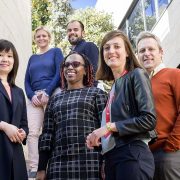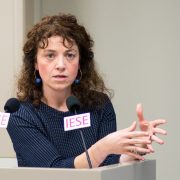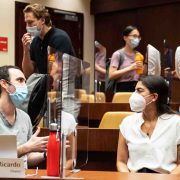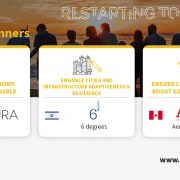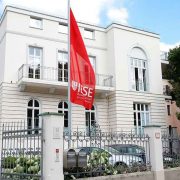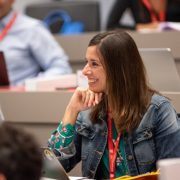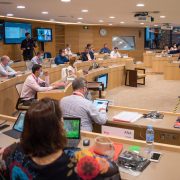- More than 500 startups from 59 countries signed up for the challenge aimed at accelerating economic and social recovery following Covid-19
- The nine most promising solutions were evaluated by a jury of innovation experts during a Digital Pitch Day held on September 9
- The three winning startups will have access to benefits such as mentoring, acceleration services, technology tools or access to events, valued at approximately 1.3 million euros
September 11, 2020. Startups Neura, 6 degrees and Aerial Technologies have been chosen from more than 500 projects from 59 countries as the winners of the global challenge ‘Restarting Together‘. The winners were chosen after presenting their solutions to a jury of innovation experts from 14 corporations, business schools and different players in the entrepreneurship sector during a digital pitch day: Boston Consulting Group, CEMEX, Telefónica, Airbus BizLab, BASF, BID Lab, Citi, Endeavor, IE, IESE Business School, MAPFRE, Microsoft for Startups, Navantia and South Summit. The objective of the first iteration of this challenge focused on innovative solutions that contribute to accelerating economic recovery and creating a more resilient society in the face of the crisis caused by the COVID-19 pandemic.
The event, which was held virtually, was attended by Eduardo Navarro, Director of Strategy and Corporate Affairs of Telefónica; Isidro Laso, Cabinet Expert for Mariya Gabriel, European Commissioner for Innovation, Research, Culture, Education and Youth.; and Jeffrey Ma, Global Head of Microsoft for Startups.
“Restarting Together is a great initiative that brings together public and private organizations to support innovative solutions and ideas that facilitate the recovery of the European economy and society through innovation and its various networks,” highlighted Isidro Laso, Cabinet Expert for Mariya Gabriel, European Commissioner for Innovation, Research, Culture, Education and Youth.
“Fourteen multinational companies have worked hard to identify those solutions that help us not only drive recovery, but to deal effectively and sustainably with similar crises in the future.”, explained Eduardo Navarro, Director of Strategy and Corporate Affairs of Telefónica.
More than 500 participants, 9 finalists and 3 winners.
The global challenge focused on the following three categories. For the first category, ‘Revamping the economy through sustainable growth’, the winning startup was Neura (USA), a platform for population participation to help solve the new challenges posed by the COVID-19 pandemic. The other finalists in this category were Colu (Israel), a platform that helps cities interact with residents by rewarding them for taking actions that promote their strategic goals; and PointGrab (Israel), a solution that allows people to analyze the workplace thanks to intelligent building sensors.
For the second category, ‘Enhancing cities and infrastructure adaptiveness and resilience’, the chosen team was 6 degrees (Israel), a platform that allows people with hand-related disabilities to regain control of their devices by accessing through smart devices. The other finalists were RightHear (Israel), a spatial orientation solution for the blind or visually impaired; and Inuma, (Rwanda), a startup committed to eradicating water scarcity and capable of giving access to clean water to more than 132,000 people, schools, businesses and farms in Rwanda.
Finally, for the category ‘Ensuring Life Continuity & Boosting Social Inclusion & Community’, the winning startup was Aerial Technologies (Canada), which solves the problems of Wifi networks thanks to Artificial Intelligence. The other finalists were Homedoctor (Spain), an application that allows being attended by emergency doctors from smartphones anytime and from anywhere; and Smile and Learn (Spain), an educational platform where children between the age of 3 and 12 have access to more than 5,000 activities, games, videos and interactive stories to have fun while learning.
All three winners will have access to benefits such as mentoring, commercial acceleration services, technology tools or access to events, valued at approximately 1.3 million euros. In addition, they have the potential to obtain corporate resources from the organizing companies to accelerate their project or even receive investment. The organizing companies that supported the challenge can also explore the potential to develop, promote or implement any of the winning solutions in partnership with the start-ups, since the global and multidisciplinary approach all of the solutions presented enable them to have the potential to achieve greater impact.
Learn more about the initiative at https://www.restartingtogether.com
——
BOSTON CONSULTING GROUP
Boston Consulting Group partners with leaders in business and society to tackle their most important challenges and capture their greatest opportunities. BCG was the pioneer in business strategy when it was founded in 1963. Today, we help clients with total transformation—inspiring complex change, enabling organizations to grow, building competitive advantage, and driving bottom-line impact. To succeed, organizations must blend digital and human capabilities. Our diverse, global teams bring deep industry and functional expertise and a range of perspectives to spark change. BCG delivers solutions through leading-edge management consulting along with technology and design, corporate and digital ventures—and business purpose. We work in a uniquely collaborative model across the firm and throughout all levels of the client organization, generating results that allow our clients to thrive.
CEMEX
CEMEX is a global building materials company that provides high-quality products and reliable services. CEMEX has a rich history of improving the well-being of those it serves through innovative building solutions, efficiency advancements, and efforts to promote a sustainable future. For more information, please visit: www.cemex.com
TELEFÓNICA
Telefónica is one of the largest telecommunications companies in the world by market capitalization and number of customers with a comprehensive offering and quality of connectivity that is delivered over world class fixed, mobile and broadband networks. As a growing company it prides itself on providing a differential experience based both on its corporate values and a public position that defends customer interests. The company has a significant presence in 14 countries in Europe and Latin America and over 344 million accesses. Telefónica is a 100% listed company and its shares are traded on the Spanish Stock Market and on those in New York and Lima.
AIRBUS BIZLAB
Airbus BizLab is a global aerospace accelerator, where startups and Airbus intrapreneurs speed up the transformation of innovative ideas into valuable businesses.
BASF
At BASF, we create chemistry for a sustainable future. We combine economic success with environmental protection and social responsibility. More than 117,000 employees in the BASF Group work on contributing to the success of our customers in nearly all sectors and almost every country in the world. Our portfolio is organized into six segments: Chemicals, Materials, Industrial Solutions, Surface Technologies, Nutrition & Care and Agricultural Solutions. BASF generated sales of €59 billion in 2019. BASF shares are traded on the stock exchange in Frankfurt (BAS) and as American Depositary Receipts (BASFY) in the U.S. Further information at www.basf.com.
IDB Lab
About IDB Lab IDB Lab is the innovation laboratory of the IDB Group, the leading source of development finance and know-how for improving lives in Latin America and the Caribbean (LAC). The purpose of IDB Lab is to drive innovation for inclusion in the region, by mobilizing financing, knowledge, and connections to co-create solutions capable of transforming the lives of vulnerable populations affected by economic, social or environmental factors. Since 1993 IDB Lab has approved more than US$ 2 billion in projects deployed across 26 LAC countries, including over US$ 300 million to develop the Venture Capital industry in the region. www.idblab.org
CITI
Citi, the leading global bank, has approximately 200 million customer accounts and does business in more than 160 countries and jurisdictions. Citi provides consumers, corporations, governments and institutions with a broad range of financial products and services, including consumer banking and credit, corporate and investment banking, securities brokerage, transaction services, and wealth management.
Additional information may be found at www.citigroup.com | Twitter: @Citi | YouTube: www.youtube.com/citi | Blog: http://blog.citigroup.com | Facebook: www.facebook.com/citi | LinkedIn: www.linkedin.com/company/citi.
ENDEAVOR
Established in 1997, Endeavor is leading the global high-impact entrepreneurship movement to drive economic growth and job creation by selecting, mentoring, and accelerating the best high-impact entrepreneurs around the world. To date, Endeavor has screened more than 60,000 individuals and selected more than 2,000 founders leading over 1,200 scale-up companies. With support from Endeavor’s worldwide mentor network, Endeavor Entrepreneurs have created over 4.1 million jobs, generate more than $24 billion in revenue each year, and inspire future generations to innovate and take risks, building strong entrepreneurship ecosystems in growth markets. Headquartered in New York City, Endeavor currently operates in 35+ growth markets throughout Africa, Asia, Europe, Latin America, the Middle East, and North America. Learn more at: www.endeavor.org, or follow us on Twitter at @endeavor_global.
IE University
IE University offers a technology-based learning ecosystem for leaders seeking to make a difference in the world through innovation, a global vision, an entrepreneurial mindset and a unique approach based on the Humanities. IE University’s faculty of more than 500 academics currently teach degrees, master’s programs, doctorates and executive training to students from 131 countries. IE University’s platform of more than 66,000 alumni is present in 165 countries.
IESE Business School
IESE is the graduate business school of the University of Navarra. It is one of the world’s most international business schools, with campuses in Barcelona, Madrid, Munich, New York and São Paulo, and programs offered throughout Europe, Africa, Asia and the Americas. For more than 60 years, IESE has been at the forefront of management education and leadership development. It has done this through offering transformational educational experiences to more than 50,000 entrepreneurs and executives. IESE´s mission today remains the same as it was back in 1958: to educate and inspire leaders who wish to have a positive and lasting impact on people, business and society. This effort has been recognized by the Financial Times ranking, which for the sixth consecutive year has positioned IESE as the number 1 school in the world for executive education. www.iese.edu
MAPFRE
MAPFRE is a global insurance company with a worldwide presence. A leading company on the Spanish market, it is the largest Spanish insurer in the world, the third largest insurance group in Latin America, and it is in sixth position in terms of Non-Life ranking in Europe by premium volume. MAPFRE has over 34,000 employees and in 2019 it had revenue of nearly 28.5 billion euros, and a net profit totaling 609 million euros. MAPFRE Open Innovation (MOi) is the company’s strategic commitment to drive customer-focused transformation through partnerships and the use of emerging technologies that create a positive impact on business and society. Using a global model, all MOi initiatives operate under a single indicator: how many clients benefit from our innovations.
MICROSOFT FOR STARTUPS
Microsoft (Nasdaq “MSFT” @microsoft) enables digital transformation for the era of an intelligent cloud and an intelligent edge. Its mission is to empower every person and every organization on the planet to achieve more
NAVANTIA
The Spanish shipbuilder Navantia, 100% owned by SEPI the Spanish Government Industrial Holding, is a world reference in the design, construction and integration of state-of-the-art ships, as well as ship repairs & modernizations. It is also engaged in the design and manufacture of Integrated Platform Management Systems, Fire Control Systems, Command and Control systems, Propulsion Plants and through life support for all its products.
Navantia has a shiprepair line of activity that goes from regular repairs to refurnishment programmes, including conversions. The company has the facilities and know how for complex repairs comprising LNG’S and Cruisers. Navantia has Fleet Maintenance Agreements with the most important ship-owners in the world. Additionally, it diversifies its activity towards the offshore wind market, being a reference manufacturer of floating structures, jackets and electric substations.
SOUTH SUMMIT
South Summit is now recognized as the global platform for innovation and high-value connections among key players in the global ecosystem, startups, corporations and investors in real business generation. An initiative created by Spain Startup in 2014, South Summit is based in Madrid, and has extended its connection network throughout the rest of Europe and Latin America, with meetings in Colombia, Mexico, Israel and the United States. South Summit19 brought together more than 20,000 attendees, among them 6,500 startups, 6,700 corporate and 1,100 investors with a portfolio of approximately $120billion. The finalists of previous editions have attracted more than $3.2 billion in investment, in addition to closing a multitude of agreements with corporations from the different productive sectors.
###
This press release contains forward-looking statements that reflect the Companies’ current expectations and projections about future events based on their knowledge of present facts and circumstances and assumptions about future events, as well as their current plans based on such facts and circumstances. xºThese statements necessarily involve risks and uncertainties that could cause actual results to differ materially from the Companies’ expectations. As a result, the companies involved do not guarantee that it will be possible to hold the described events, including the digital Pitchday on September 9, or award access to investments or corporate resources from the Companies. The companies involved are not responsible for the content of any third-party website or webpage referenced to or accessible through this press release.

